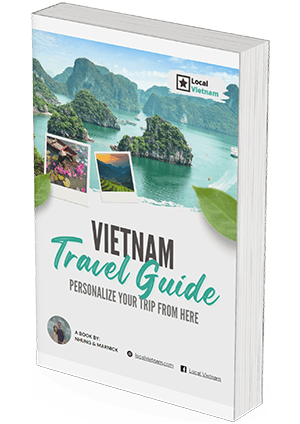About the Thu Bon River
The Thu Bon River begins in the Central Highlands, flowing from Ngoc Linh Mountain in Kon Tum Province through Quang Nam before emptying into the South China Sea at Cua Dai, just outside Hoi An. Along the way, it passes through rural districts like Tien Phuoc, Duy Xuyen, and Dai Loc, shaping the landscape and livelihoods of the region.
Historically, the river played a key role in Hoi An’s rise as a major trading port during the 16th and 17th centuries. It connected inland craft villages and farming communities to the coast, where merchants from across Asia and Europe arrived to trade silk, ceramics, and spices. Even earlier, during the Champa era, the river served as a link between the ancient capital and the ocean via the port of Cua Dai Chiem.
Today, the Thu Bon River remains essential to local life. Fishermen still cast their nets in its waters, farmers rely on it for irrigation, and boats continue to carry people and goods between the countryside and the town. For travelers, it offers a quieter, scenic alternative to the bustle of Hoi An Old Town — with riverbanks lined with rice fields, water palms, and small villages, especially beautiful at sunrise or sunset.
Best Thu Bon River boat trips
A boat trip on the Thu Bon River is one of the easiest ways to experience the calm countryside around Hoi An. It gives you a break from the busy Old Town and a different view of local life. Here are the most common types of river trips and what to expect.
1. Sunset & lantern boat ride in Hoi An
The most well-known option, especially in the evenings. These short trips (15–30 minutes) take place right in the heart of the Ancient Town.
You board small wooden boats, often piloted by local women, and float past the lantern-lit waterfront. The highlight is releasing your own paper lantern into the river — a simple but iconic experience in Hoi An.
It’s not really a river cruise though. You don’t travel far — just up and down a short section near the town. It’s more about the atmosphere than seeing the river itself.
Read more in our full guide to Hoi An boat rides.
2. Half-Day river cruise to craft villages
This option takes you farther along the Thu Bon River and includes visits to traditional villages like:
- Kim Bong Carpentry Village – known for wooden boatbuilding and hand-carved furniture
- Thanh Ha Pottery Village – home to terracotta artisans with live demos
- Tra Nhieu or Duy Vinh – smaller rural villages focused on farming or mat weaving
These trips usually last 3–4 hours and combine river views, peaceful stretches of countryside, and cultural stops. Some include lunch, hotel pickup, or guide explanations — others are simple transport-based.
Best for travelers interested in combining sightseeing with culture, or if you want to explore outside of Hoi An without a long drive.
3. Private boat tide (Short trip from Old Town)
If you’re short on time but want a taste of the river beyond the lantern boats, a private boat ride is easy to arrange on the spot near the town docks.
Trips usually last 30 to 60 minutes. You’ll float past quieter sections beyond the main tourist strip, see palm trees, small fishing boats, and the occasional riverside village. No tour group, no pressure — just a slow-paced look at life along the water.
It’s a flexible and affordable option. Expect to pay around 200,000–400,000 VND depending on duration and negotiation. No booking needed — just walk to the riverbank during the day.
4. Thu Bon River cruise with meals
Less common, but some operators offer longer cruises with lunch or dinner included — usually private bookings or special packages.
These can include:
- Multi-course local meals served on board
- Small group sunset cruises with drinks
- Village visits plus cooking classes combined with a boat ride
It’s not a common “drop-in” activity like in Hoi An town, so you’ll need to book in advance (often part of premium or custom tours).
5. Boat ride as part of a tour
Some tours use the Thu Bon River as part of a more complete experience:
- My Son Temple tours: some return by boat instead of bus, offering a quiet end to the tour with a short stop at a riverside village
- Countryside biking tours: many cross the river by boat to reach islands or quiet farming areas on the opposite bank
- Fishing village tours: often include a boat ride through backwater channels or smaller river branches
This is a good option if you’re already doing another activity and want to include a boat ride without booking one separately.
Kayaking & SUP on the Thu Bon River
If you’re looking for a more active way to explore the Thu Bon River, kayaking and stand-up paddleboarding (SUP) are great options. These activities offer a peaceful, up-close experience with the river, and are ideal for those who enjoy nature, photography, or light adventure.
The river has calm stretches, especially in the morning, making it beginner-friendly. You can glide through open water, mangrove channels, and small side streams — often passing by fishermen, coconut palms, and quiet villages.
These activities are only available as part of guided tours, not for rent on your own. Tours vary in focus:
- Some go through mangrove zones and nipa palm forests near the outskirts of Hoi An.
- Others take you along more open stretches of the river, sometimes entering parts of the Ancient Town by water.
- Early morning or sunset tours are the most popular — combining soft light, cool weather, and scenic reflections.
Cultural sights along the Thu Bon River
Several traditional craft villages sit quietly along the Thu Bon River, offering a glimpse into rural life and age-old skills that shaped Hoi An’s trading history. These villages are easy to reach by boat, bike, or a mix of both.
Kim Bong Carpentry Village
Located just across the river from the Ancient Town, Kim Bong is known for traditional wood carving and boat building. You can walk around small workshops, see how wooden furniture and boats are made, and sometimes even meet artisans at work.
Best reached by a quick boat ride (10 minutes) from Hoi An.
Thanh Ha Pottery Village
Thanh Ha Pottery Village is famous for handcrafted ceramics made using traditional techniques. Visitors can try their hand at pottery on a foot-powered wheel, and visit the Pottery Museum to see large-scale models of famous Vietnamese landmarks made from clay.
Reachable by boat (20–30 minutes) or a short bike ride.
Tra Nhieu & Duy Vinh Villages
These lesser-known villages offer a peaceful contrast to the more visited sites. Here, the focus is on mat weaving, farming, and quiet riverside life. Great for travelers interested in authentic rural experiences.
Often included in countryside bike tours with short boat crossings.
Evening lantern experience
One of the most iconic experiences in Hoi An is releasing paper lanterns onto the Thu Bon River at night. You’ll see dozens of small rowboats along the Old Town docks offering short evening rides (usually 15–20 minutes), where you can float a lantern and take in the glowing reflections across the water.
- Where & how: Just head to the riverbank near the central bridge or night market — boat operators are easy to find. Lanterns are typically sold by local women for 10,000–20,000 VND each.
- Boat ride cost: Expect to pay around 100,000–150,000 VND for a short ride for two people. Bargaining is common.
- Tips: Go around 6:30–8:00 PM for the full atmosphere, but avoid weekends if you want to skip the crowds.
It’s very touristy, but still a memorable and picturesque activity — especially if it’s your first time in Hoi An. Keep in mind: while beautiful, these lanterns can contribute to river pollution. Many aren’t biodegradable, and not all are collected afterward.
Coconut Basket Boats at Bay Mau
While not part of the Thu Bon River itself, the Bay Mau Water Coconut Forest is connected to its lower channels through smaller waterways. It’s a popular activity for travelers looking for something fun and light-hearted.
- What to expect: You’ll hop into a small, round “basket boat” steered by a local guide who often sings, spins the boat in circles, or puts on a show. Some tours include fishing net demonstrations and traditional games.
- Who it’s for: Great for families with kids or travelers wanting a cheerful, hands-on experience. Not ideal if you’re looking for peace and quiet.
Tours usually start near Cam Thanh and last 45–60 minutes. They can be booked on-site or through a tour package that includes transfers from town. Read here the full guide about coconut basket boats in Hoi An.
Tips for exploring the Thu Bon River
- Best time of day: Early morning and late afternoon offer the calmest water, cooler temperatures, and soft lighting for photos.
- Best season: The dry season (February to August) is ideal. From September to January, the river can be high or rough after storms, and tours may be limited.
- What to bring: Sun protection (hat, sunscreen), drinking water, and insect repellent if going near mangroves or in the late afternoon.
- Booking tips: You can negotiate directly with boat operators along the Old Town docks, but it’s often easier (and clearer) to book through a hotel, tour company, or online provider—especially for longer trips or village tours.
Is it worth doing a Thu Bon River boat tour?
Yes — if you’re drawn to calm scenery, cultural insights, and slower-paced travel, the Thu Bon River offers a gentle contrast to the buzz of Hoi An’s Ancient Town. It’s not a thrilling adventure, but it’s a nice way to experience the region’s landscape and daily life from the water.
- Great for: travelers who enjoy boat rides, families, photographers, or anyone looking to connect with Hoi An’s rural side.
- Less ideal for: those expecting dramatic sights or lots of action.
Pro tip: Combine the river with a visit to a craft village or do a tour that already includes a boat ride — this often makes the experience more worthwhile.


